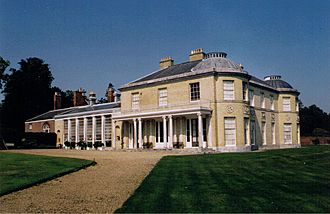Belmont House and Gardens facts for kids
Quick facts for kids Belmont House |
|
|---|---|

Belmont House
|
|
| General information | |
| Type | House |
| Town or city | Throwley, near Faversham |
| Country | United Kingdom |
| Estimated completion | Between 1769 and 1793 |
| Client | Edward Wilks, store-keeper at the nearby Faversham Powder Mill |
| Owner | Harris family |
| Grounds | 14 acres |
| Design and construction | |
| Architect | Samuel Wyatt |
Belmont House is a beautiful old house and gardens located in Throwley, a village near Faversham in east Kent, England. It was built between 1769 and 1793. People often say it's a wonderful example of Georgian architecture that still looks just as it did long ago.
The house is especially famous for having the largest private collection of clocks in all of England. In March 2023, Belmont House, its gardens, and its amazing clock collection were shown on the BBC TV show Antiques Roadshow. The episode was filmed in 2022. Belmont House was also featured in the CBBC show Hetty Feather.
Contents
History of Belmont House
Before 1769, there was no house or large estate on this land. That year, Edward Wilks bought the property. He was a store-keeper at the Royal Powder Mills nearby.
Building the House
The first part of the house was designed by a famous architect named Samuel Wyatt. This original building is still part of the larger house you see today. Most of the current house was built between 1789 and 1793. This work was done by Colonel John Montresor, who was part of the Royal Engineers.
New Owners and the Clock Collection
Colonel Montresor's career ended early. In 1801, the house was sold at an auction. General George Harris, 1st Baron Harris bought Belmont for £9,000. His family, the Harris family, has lived at Belmont ever since.
The incredible clock collection at Belmont was put together by the 5th Lord Harris. He was the first President of the Antiquarian Horological Society, which is a group interested in old clocks. Today, the house is looked after by a special trust set up by Lord Harris.
Exploring the Gardens
The gardens at Belmont House are quite large, covering about 14 acres. They are a lovely place to explore.
Garden Features
In the grounds, you can find many interesting areas:
- A walled garden where plants are protected.
- A pinetum, which is a collection of different types of pine trees.
- A Victorian shell grotto, a small cave-like structure decorated with shells.
- An orangery, a special greenhouse filled with orange trees, palm trees, and other tropical plants.
In 2001, the kitchen garden was brought back to life. It was redesigned by Arabella Lennox-Boyd, a well-known garden designer.
The Walnut Walk and Prospect Tower
One path in the garden is called the Walnut Walk. As you walk along it, you pass a line of graves for pets. This path leads to the 'Prospect Tower'. This tower was first used as a summerhouse, a place to relax in the warmer months. Later, George Harris, 4th Baron Harris used it as a pavilion. You can even rent the tower for a stay through the Landmark Trust.
 | May Edward Chinn |
 | Rebecca Cole |
 | Alexa Canady |
 | Dorothy Lavinia Brown |

